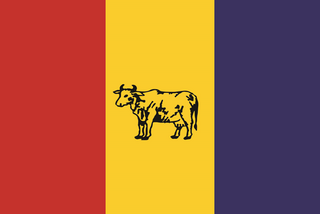
The politics of Nepal functions within the framework of a parliamentary republic with a multi-party system. Executive power is exercised by the Prime Minister and their cabinet, while legislative power is vested in the Parliament.
The shadow cabinet or shadow ministry is a feature of the Westminster system of government. It consists of a senior group of opposition spokespeople who, under the leadership of the Leader of the Opposition, form an alternative cabinet to that of the government, and whose members shadow or mirror the positions of each individual member of the Cabinet. Their areas of responsibility, in parallel with the ruling party's ministries, may be referred to as a shadow portfolio. Members of a shadow cabinet have no executive power. It is the shadow cabinet's responsibility to scrutinise the policies and actions of the government, as well as to offer alternative policies. The shadow cabinet makes up the majority of the Official Opposition frontbench, as part of frontbenchers to the parliament. Smaller opposition parties in Britain and Ireland have Frontbench Teams.

The Nepali Congress is a social democratic political party in Nepal and the largest party in the country. The party has 870,106 members as of the party's 14th general convention in December 2021, making it the largest party by membership in Nepal. In June 2023, the party started online membership since the emergence of youth leaders in vital posts to attract youths to the party. The party is led by former prime minister, Sher Bahadur Deuba since the party's thirteenth general convention in 2016. The party won 89 seats in the 2022 general election and is currently the largest parliamentary group in the House of Representatives.

The Communist Party of Nepal (Unified Marxist–Leninist) (Nepali: नेपाल कम्युनिष्ट पार्टी (एकीकृत मार्क्सवादी-लेनिनवादी), romanized: nēpāl kamyuniṣṭ pārṭī (ēkīkṛt mārksavādī-lēninavādī); abbr. CPN (UML)) is a communist political party in Nepal. The party emerged as one of the major parties in Nepal after the end of the Panchayat era.
The Official Opposition Shadow Cabinet, or His Majesty’s Most Loyal Opposition Shadow Cabinet, but usually simply the Shadow Cabinet, is the committee of senior members of the Official Opposition who scrutinise the work of the Cabinet of the United Kingdom. Each Shadow Cabinet member is typically given a position which corresponds to that of a government minister in Cabinet.
The Liberal Democrats are a political party in the United Kingdom. While in opposition, the Leader of the Liberal Democrats appoints a frontbench team of members of Parliament (MPs), peers in the House of Lords, members of the Scottish Parliament (MSPs), and members of the Senedd (MSs) to speak for the party on different issues. Their areas of responsibility broadly corresponded to those of Government ministers. The frontbench team is divided into departmental sub-units, the principal ones being the economy, foreign policy, and home affairs. Sometimes the frontbench team consists of more than just the principal positions.

The Rastriya Prajatantra Party is a constitutional monarchist and Hindu nationalist political party in Nepal.
General elections were held in Nepal on 15 November 1994 to elect the House of Representatives. The election took place after the Nepali Congress government collapsed and King Birenda called new elections. The results showed that the Communist Party of Nepal won the most seats in the House of Representatives and Man Mohan Adhikari became Prime Minister at the head of a minority government.

The Nepal Communist Party, abbreviated NCP is a defunct communist party which existed in Nepal from 2018 to 2021. It was founded on 17 May 2018, from the unification of two leftist parties, Communist Party of Nepal and Communist Party of Nepal. The unification was completed by the Party Unification Coordination Committee, after eight months of negotiation. The two predecessor parties subsequently dissolved, making way for the new united party. The party retained the electoral symbol of the CPN (UML), the sun.

Rabindra Prasad Adhikari was a Nepali politician and three-time parliamentarian, belonging to the Nepal Communist Party (NCP). He was Minister of Culture, Tourism and Civil Aviation from 16 March 2018 until his death in a helicopter crash in February 2019. He was the Kaski District secretary of the party. In the 2008 Constituent Assembly election, Adhikari was elected from the Kaski-3 constituency, with 13,386 votes. In the 2013 Constituent Assembly election, he was re-elected from the Kaski-3 constituency, with 15,456 votes. In 2017, CPN-UML candidate Rabindra Adhikari won parliamentary elections from Kaski Constituency No. 2. Representing the left alliance, Adhikari secured 27,207 votes to defeat Nepali Congress candidate Dev Raj Chalise, who got 18,661 votes. After his demise, his wife Bidya Bhattarai won Kaski Constituency-2 with a wide margin of 8,403 votes in the by-election. Bhattarai secured 24,394 votes, while her nearest contender Khem Raj Poudel from the main opposition Nepali Congress got 15,991. Socialist Party's Dharma Raj Gurung got 1,922 votes. He authored the books Constituent Assembly, Democracy and Re-structuring.

Natasha Wendy Anita MazzoneMP OSI is a South African politician who served as the Chief Whip of the Official Opposition in the National Assembly of South Africa from October 2019 until August 2022. She has been a Member of the National Assembly, representing the official opposition Democratic Alliance (DA), since 2009. She was the second Deputy Federal Council Chairperson of the DA and the party's spokesperson on state capture. Mazzone has previously served as Shadow Minister of Public Enterprises and of Communications.
The Welsh Shadow Cabinet is formed from members of the official opposition in the Senedd, the largest party not part of the Welsh Government, to scrutinise ministers in the Welsh Cabinet. It is led by the Leader of the Opposition, who typically appoints members of the Senedd (MSs) from their party as shadow ministers with portfolios which mirror ministerial posts in the Cabinet who scrutinise ministers and can propose their own alternative policies. Other opposition parties in the Senedd also appoint frontbench teams of spokespeople who perform the same function. These are also sometimes styled as "shadow cabinets" by their parties, though unlike the Shadow Cabinet they have no official recognition. Since 2021, the Shadow Cabinet has been formed from members of the Welsh Conservatives led by Andrew RT Davies, who have alternated with Plaid Cymru as the official opposition in the Senedd since its establishment as the National Assembly for Wales in 1999.

Khadga Prasad Sharma Oli, commonly known as K. P. Sharma Oli or simply K.P. Oli, is a Nepalese politician who is serving as the prime minister of Nepal since 15 July 2024.
In Australian federal politics, the shadow cabinet is the opposition's equivalent to the federal cabinet. It comprises the most senior figures within the opposition, headed by the leader of the opposition as the counterpart to the prime minister of Australia.
Rastriya Prajantantra Party (Samyukta) (Nepali: राष्ट्रिय प्रजातन्त्र पार्टी (संयुक्त)), literally the National Democratic Party (United) and abbreviated RPP (U), was a political party in Nepal. It was formed on 6 August 2017 by Pashupati Shamsher Jang Bahadur Rana after splitting from the Rastriya Prajatantra Party as the Rastriya Prajatantra Party (Democratic). On 31 January 2019, it merged with the Unified Rastriya Prajatantra Party (Nationalist), another splinter group of the Rastriya Prajatantra Party, to form Samyukta.
Laxmi Pariyar is a Nepali politician and a member of the House of Representatives of the federal parliament of Nepal. She was elected under the proportional representation system of the Nepali Congress. She leads the Ministry of Land Reform in the Nepali Congress shadow cabinet.
Mina Subba is a Nepali politician and a member of the House of Representatives of the federal parliament of Nepal. She was elected under the proportional representation system from Nepali Congress, filling the reserved seat for women and indigenous groups. She is a member of the House Public Accounts Committee. She is also a member of the Ministry of Water Supply in the shadow cabinet formed by the main opposition party, Nepali Congress.
Pramila Rai is a Nepali politician and an incumbent member of the House of Representatives of the federal parliament of Nepal. She was also elected to the first constituent assembly in 2008. Daughter of prominent Nepali Congress leader Bal Bahadur Rai, she joined politics as a student, as a member of the student wing of Nepali Congress. Both her elections to the constituent assembly in 2008 and to the House of Representatives in 2017 were under the proportional representation system. An influential party leader in Udayapur District, she contested the second constituent assembly election from Udayapur-2 constituency under the first-past-the-post system but was defeated.
Baxolile Babongile Nodada is a South African politician for the Democratic Alliance who has been a Member of Parliament since 2019. He served as the Shadow Minister of Basic Education and the Parliamentary Counsellor to the Leader of the Opposition in John Steenhuisen's Shadow Cabinet from 2020 until the DA entered national government in July 2024.

At the end of 2020, a major split in the Nepal Communist Party (NCP) revived the Communist Party of Nepal and the Communist Party of Nepal.









